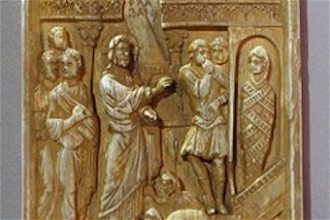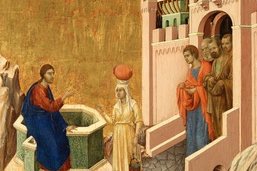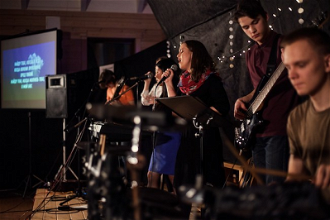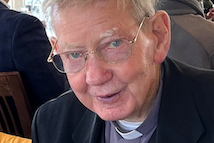Sunday Reflection with Fr Robin Gibbons - 31 March 2019
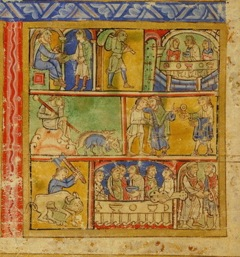
Eadwine Psalter
Fourth Sunday in Lent
Brothers and sisters:
Whoever is in Christ is a new creation:
the old things have passed away;
behold, new things have come.
And all this is from God,
who has reconciled us to himself through Christ
and given us the ministry of reconciliation. (2 Cor 5:17-19)
The parable of the foolish, loving, good father and his two ungrateful sons is so well known that we immediately think we know exactly what it is all about. Sin and repentance, restoration and forgiveness by God; so easy, full marks! Only I realise that the more I look at it, the more complex and disturbing is the message. It isn't a straightforward story and there are a number of hidden meanings, slightly obscured by the main drama of the younger son running away with all his wealth to live a life of debauchery.
Lets try and tease out a few images for our own thoughts, but as we do I'd want to keep the quote from 2 Corinthians 5: 17-18 firmly in our minds. The starting point for any of us is never at the beginning, but at the end, at the Resurrection, that's the constant given, the foundation to anything we hear or read in scripture, the heart of our vocation as Christians.
We are a new creation, we have put on Christ, we have received the Spirit, we are alive with Him, so those last words of Jesus in the parable: "now we must celebrate and rejoice, because your brother was dead and has come to life again; he was lost and has been found,"(Lk 15:32) refer to all of us as we are now, not as we will be or what is to come. It means NOW, today, this very moment! If we start with this truth then the parable of the two sons becomes not only a tale of two different characters and the foolishness of God, who is of course the Father, but of a challenge to us.
What do I mean? It is easy to identify with either brother, a lot tend towards the younger as he seems to have more chutzpa about him, but hold on some of us can identify with the older brother, for he is also an unknown, the hint is that he is dependable, reliant, faithful-that's the father's language, even if at this moment of tension in the story, his anger and resentment boils over in to statements he probably will regret later!
It's not a simple forgiveness and mercy parable at all is it? The younger son does not seem to be at all repentant in a deep sense, any hint of a new life? Restitution? Will he help with the farm and work of the father and other brother? I doubt it, that sort goes its merry way through life, asking a form of forgiveness but never ever really becoming totally responsible, sure though that the father will keep bailing him out! And the older brother, aggressive and angry with the father, why on earth should he not be? After all a huge amount of good money has been wasted and now good food and clothing is being wasted again- for what. Are any lessons being learnt? We just don't know, the ending of the story doesn't tell us, but it does say to us; "My sons and daughters, you are here with me always;
everything I have is yours". (Lk 15:31) I think that's the point, no matter what we do, the promises of God will stand firm and true-we are made new, we are God's children, we are ever forgiven. The point is can we push ourselves a little bit more and start being like that foolish loving merciful father? What a difference we'd' make if we could!
Lectio Divina
From Mother Maria Skobtsova of Paris, (St Maria in the Orthodox Church) who was executed March 31st 1945 in Ravensbruck
The way to God lies through love of people. At the Last Judgment I shall not be asked whether I was successful in my ascetic exercises, nor how many bows and prostrations I made. Instead I shall be asked did I feed the hungry, clothe the naked, visit the sick and the prisoners. That is all I shall be asked. About every poor, hungry and imprisoned person the Saviour says 'I': 'I was hungry and thirsty, I was sick and in prison.' To think that he puts an equal sign between himself and anyone in need. . . . I always knew it, but now it has somehow penetrated to my sinews. It fills me with awe.
Return of the Prodigal son
"Celebration belongs to God's Kingdom. God not only offers forgiveness, reconciliation, and healing, but also wants to lift up these gifts as a source of joy for all who witness them. In all three of the parables that Jesus tells to explain why he eats with sinners, God rejoices and invites others to rejoice with him. "Rejoice with me," the shepherd says, "I have found my sheep that was lost." "Rejoice with me," the woman says, "I have found the drachma I lost." "Rejoice with me," the father says, "this son of mine was lost and is found." All these voices are the voices of God. God does not want to keep his joy to himself. He wants everyone to share in it. God's joy is the joy of his angels and his saints; it is the joy of all who belong to the Kingdom." Henri JM Nouwen
Fr Robin Gibbons is an Eastern Rite Catholic Chaplain for Melkites in the UK. He is also an Ecumenical Canon of Christ Church Cathedral, Oxford. Today is the 40th anniversary of his Ordination. Congratulations Fr Robin!
See also Message from Fr Robin - www.indcatholicnews.com/news/36815




